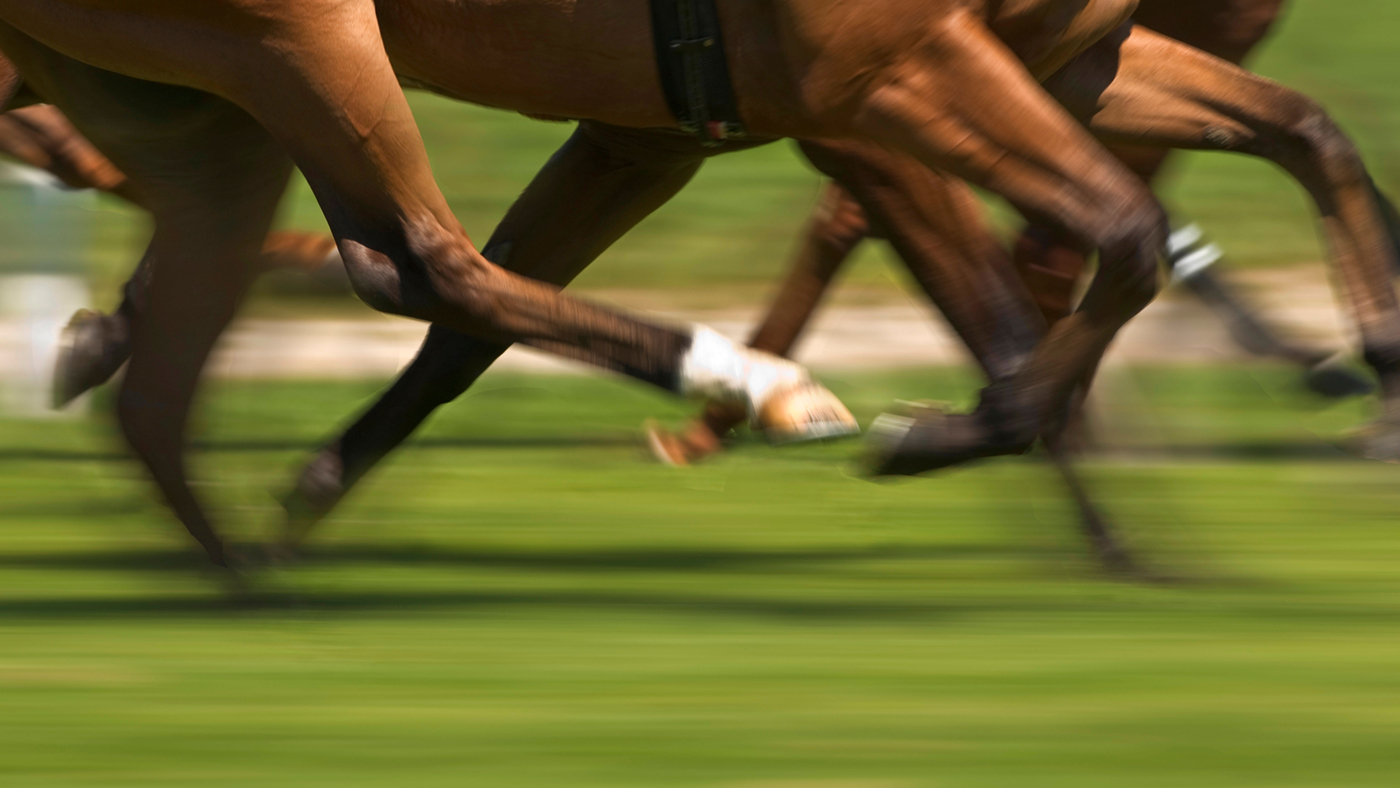The role of elite riders, social media, vaccinating against equine flu and the media were among the topics covered by a varied panel at the World Horse Welfare conference on 13 November.
Showjumper Joe Stockdale, Royal Veterinary College lecturer Madeleine Campbell, BBC racing journalist Joe Wilson, New Forest commoner Lyndsey Stride and vet Julie Ross, a World Horse Welfare trustee, joined broadcaster Mike Cattermole to discuss “a responsible approach”, fitting the event’s theme: “Who is responsible?”
The first topic was on the role elite riders have in promoting appropriate training methods.
Joe Stockdale said top riders can have a huge impact as their opinion is highly valued.
{"content":"PHA+4oCcRXNwZWNpYWxseSBub3cgd2l0aCBzb2NpYWwgbWVkaWEsIHRoZXJl4oCZcyBhIGxvdCBtb3JlIG9wcG9ydHVuaXR5IHRvIGdldCBpbmZvcm1hdGlvbiBhY3Jvc3MsIGJ1dCB0aGF0IGNvbWVzIHdpdGggZGFuZ2VycyzigJ0gaGUgc2FpZC4g4oCcVGhlIG1haW4gcG9pbnQgaXMgdGhlIGNsYXJpdHkgdGhleSBuZWVkIGluIHRoZSB0ZWNobmlxdWVzIHRoZXkgcHJvbW90ZS7igJ08L3A+CjxwPkpvZSBleHBsYWluZWQgdGhhdCB3aGlsZSBmZWxsb3cgdG9wIHJpZGVycyBtYXkgdW5kZXJzdGFuZCBwb2ludHMgbWFkZSwgb3RoZXJzIG1heSBub3QuPC9wPgo8cD7igJxJdOKAmXMgZWFzeSBmb3IgcGVvcGxlIHRvIHRoaW5rIHRoZXnigJlyZSBkb2luZyBzb21ldGhpbmcgcmlnaHQgYmVjYXVzZSB0aGV54oCZdmUgc2VlbiBhIHRvcCByaWRlciBkb2luZyBpdCBhbmQgdGhleeKAmXJlIHRyeWluZyB0byByZXBsaWNhdGUgaXQsIGJ1dCB0aGV54oCZcmUgbm90IHNlZWluZyB3aGF0IGhhcHBlbnMgYmVoaW5kIHRoZSBzY2VuZXMu4oCdPC9wPgo8ZGl2IGNsYXNzPSJhZC1jb250YWluZXIgYWQtY29udGFpbmVyLS1tb2JpbGUiPjxkaXYgaWQ9InBvc3QtaW5saW5lLTMiIGNsYXNzPSJpcGMtYWR2ZXJ0Ij48L2Rpdj48L2Rpdj4KPHA+RHIgQ2FtcGJlbGwgc2FpZCB0aGlzIHRpZXMgaW50byB0aGUgaWRlYSBvZiBlcXVlc3RyaWFuaXNt4oCZcyBzb2NpYWwgbGljZW5jZSB0byBvcGVyYXRlLCBhbmQgcGVyc3VhZGluZyBzb2NpZXR5IHRoYXQgaG9yc2VzIHNob3VsZCBzdGlsbCBiZSB1c2VkIGluIGNvbXBldGl0aW9uLCBzbyBoYXZpbmcgeW91bmcgcmlkZXJzIHByb21vdGluZyB0aGUgc3BvcnQgYW5kIGFkdm9jYXRpbmcgZ29vZCB0cmFpbmluZyBtZXRob2RzIGlzIGltcG9ydGFudC4gQnV0IHRoZXNlIG1ldGhvZHMgbXVzdCBiZSBldmlkZW5jZS1iYXNlZCwgZW1waGFzaXNpbmcgdGhlIGltcG9ydGFuY2Ugb2YgY29sbGFib3JhdGlvbiBhY3Jvc3MgdGhlIGluZHVzdHJ5LjwvcD4KPHA+TXIgV2lsc29uIHNhaWQgaW4gcmVjZW50IHllYXJzLCB3ZWxmYXJlIGhhcyBiZWNvbWUg4oCccGFydCBvZiB0aGUgbWFpbnN0cmVhbSBkaXNjdXNzaW9u4oCdLCB3aGljaCBpcyBwb3NpdGl2ZSwgYW5kIG1lYW5zIG1vcmUgc2NydXRpbnkuPC9wPgo8ZGl2IGNsYXNzPSJhZC1jb250YWluZXIgYWQtY29udGFpbmVyLS1tb2JpbGUiPjxkaXYgaWQ9InBvc3QtaW5saW5lLTQiIGNsYXNzPSJpcGMtYWR2ZXJ0Ij48L2Rpdj48L2Rpdj4KPHA+4oCcSeKAmXZlIGFsd2F5cyBmZWx0IHRoZSBqb3VybmFsaXN04oCZcyByZXNwb25zaWJpbGl0eSBpcyB0byBwcm92aWRlIHRoZSBicmlkZ2UgYmV0d2VlbiBleHBlcnRpc2UgYW5kIGdlbmVyYWwgb3BpbmlvbizigJ0gaGUgc2FpZCwgYWRkaW5nIHRoYXQgd2hpbGUgaXQgd291bGQgaGF2ZSBiZWVuIGVhc3kgdG8gdGFrZSBleHRyZW1lIOKAnHNvdW5kYml0ZXPigJ0gZnJvbSBhbmltYWwgYWN0aXZpc3RzIGluIHRoZSBwYXN0LCBoZSBpbnN0ZWFkIGhhcyBzcG9rZW4gdG8gV29ybGQgSG9yc2UgV2VsZmFyZSBhcyBoZSBmZWx0IGlmIGhlIHdhbnRlZCB0byBhZmZlY3QgY2hhbmdlLCBoZSBuZWVkZWQgYSBjcmVkaWJsZSBzb3VyY2UuPC9wPgo8cD7igJxXaXRoIFtyZWNlbnQgd2VsZmFyZSBjb25lcm5zXSBpbiBBdXN0cmFsaWFuIHJhY2luZywgaXQgc2VlbXMgdG8gbWUgdGhhdCBzb2NpYWwgbGljZW5jZSBpcyBpbiBqZW9wYXJkeS4gU28gd2l0aCBzb2NpYWwgbWVkaWEsIGEgZ3JvdXAgc2VlaW5nIGhvcnNlIHNwb3J0IGFzIHdyb25nIGNhbiB0YWtlIGNvbnRyb2wgb2YgdGhlIGFnZW5kYS7igJ08L3A+CjxkaXYgY2xhc3M9ImFkLWNvbnRhaW5lciBhZC1jb250YWluZXItLW1vYmlsZSI+PGRpdiBpZD0icG9zdC1pbmxpbmUtNSIgY2xhc3M9ImlwYy1hZHZlcnQiPjwvZGl2PjwvZGl2Pgo8cD5IZSBhZGRlZCB0aGF0IHdoZW4gcGVvcGxlIGFyZSBib21iYXJkZWQgd2l0aCBpbmZvcm1hdGlvbiwgYSBncm91cCB3aXRoIGNyZWRpYmlsaXR5IGhhcyBhbiBldmVuIGdyZWF0ZXIgcmVzcG9uc2liaWxpdHkgdG8gZ2V0IHRoZSByaWdodCBtZXNzYWdlIGFjcm9zcy48L3A+CjxwPk1zIFJvc3Mgc2FpZCDigJx0aGUgd2hvbGUgZWNvc3lzdGVt4oCdIGhhcyB0byBiZSBpbnZvbHZlZCBpbiBzcHJlYWRpbmcgdGhlIHdvcmQgb24gYXBwcm9wcmlhdGUgbWV0aG9kczsgdHJhaW5lcnMsIHZldHMgYW5kIG93bmVycyBhcyB3ZWxsIGFzIHJpZGVycy48L3A+CjxwPlZldHMgYWxzbyBoYXZlIGEgcmVzcG9uc2liaWxpdHkgZm9yIGVuZ2FnaW5nIHdpdGggb3duZXJzIG9uIGZsdSB2YWNjaW5hdGlvbiwgRHIgQ2FtcGJlbGwgc2FpZCwgYXMgdGhlIHBhbmVsIHdhcyBhc2tlZCBob3cgd2UgY2FuIGltcHJvdmUgdXB0YWtlLCB3aXRoIHNvbWUgMzAlIG9mIFVLIGhvcnNlcyBjdXJyZW50bHkgdmFjY2luYXRlZC48L3A+CjxwPuKAnFRoZXJl4oCZcyBhIHJvbGUgZm9yIHZldHMgb24gcHJvdmlkaW5nIGluZm9ybWF0aW9uIG9uIHRyYW5zbWlzc2lvbiwgaGVhbHRoIGFuZCB3ZWxmYXJlIGltcGFjdHMgYW5kIHdoYXQgd2UgY2FuIGRvIGluIGJpb3NlY3VyaXR5IGFuZCB2YWNjaW5hdGlvbizigJ0gc2hlIHNhaWQsIGFkZGluZyB0aGF0IHZldHMgc2hvdWxkIGhlbHAgb3duZXJzIHVuZGVyc3RhbmQgd2h5IHBhcnQgb2YgcmVzcG9uc2libGUgb3duZXJzaGlwIGluY2x1ZGVkIHZhY2NpbmF0aW9uLiBTaGUgYXNrZWQgd2hldGhlciByYXRlcyB3b3VsZCBpbmNyZWFzZSBpZiBwcmljZXMgZHJvcHBlZCwgYW5kIGlmIHNvLCB3aG9zZSByZXNwb25zaWJpbGl0eSB3b3VsZCBpdCBiZSwgYWRkaW5nIHRoYXQgcHJpY2VzIHJlZmxlY3Qgbm90IG9ubHkgZHJ1Z3PigJkgY29zdCwgYnV0IHRoYXQgb2Ygb3RoZXIgbWVkaWNpbmVzIHRoYXQgZG8gbm90IGdldCB0byBtYXJrZXQuPC9wPgo8aDM+RHIgR29vZ2xlPC9oMz4KPHA+TXMgUm9zcyBzYWlkIHBlb3BsZSB0dXJuIHRvIOKAnERyIEdvb2dsZeKAnSwgd2hpY2ggaXMg4oCcdW5mb3J0dW5hdGXigJ0gYnV0IHRoYXQgdHJ5aW5nIHRvIGNvbnZpbmNlIG93bmVycyB3aXRoIHNjaWVuY2UgbWF5IG5vdCB3b3JrLCBzbyB2ZXRzIHNob3VsZCBjb25zaWRlciBob3cgdGhleSB0YWxrIHRvIHBlb3BsZSByYXRoZXIgdGhhbiB3aGF0IHRoZXkgc2F5LjwvcD4KPHA+QSBndWVzdCBhbHNvIGFza2VkIHdoZXRoZXIgYWxsIGdvdmVybmluZyBib2RpZXMgY291bGQgc2V0IHRoZSBzYW1lIHJ1bGVzIG9uIHZhY2NpbmF0aW9uIGZyZXF1ZW5jeSBhcyBhIGNvbnNpc3RlbnQgbWVzc2FnZS48L3A+CjxwPlRoZSBmaW5hbCBwb2ludCB3YXMgd2hldGhlciwgaW4gYSBwb2xhcmlzZWQgd29ybGQsIHRoZSBtZWRpYSB0ZW5kcyB0byBoaWdobGlnaHQgZXh0cmVtZSByYXRoZXIgdGhhbiBtYWluc3RyZWFtIHZpZXdzIG9uIHdlbGZhcmUuPC9wPgo8cD5NciBXaWxzb24gc2FpZCB0aGVyZSBjYW4gYmUgYSBkYW5nZXIgb2YgdGhpcywgYnV0IGZvciBqb3VybmFsaXN0cywgYmFsYW5jZSBpcyDigJxhdCB0aGUgaGVhcnTigJ0sIGFkZGluZzog4oCcSWYgeW914oCZcmUgY3JpdGljaXNlZCBieSBib3RoIHNpZGVzLCB5b3XigJlyZSBwcm9iYWJseSBkb2luZyBpdCByaWdodC7igJ08L3A+CjxwPkhlIHNhaWQgYmFsYW5jZSBpcyBub3QgcHJlc2VudCBpbiB0aGUgc29jaWFsIG1lZGlhIOKAnGp1bmdsZeKAnSwgYW5kIHRoYXQgaGUgcmVjb21tZW5kcyBwZW9wbGUgaW4gdGhlIGluZHVzdHJ5IG1haW50YWluIGdvb2QgcmVsYXRpb25zaGlwcyB3aXRoIGluZGVwZW5kZW50LCB0cnVzdHdvcnRoeSBqb3VybmFsaXN0cy48L3A+CjxwPuKAnFRoZXJlIGFyZSBhIGZldyBvZiB1cyHigJ0gaGUgc2FpZCwgZ29pbmcgb24gdG8gc2F5IHRoZSBwb3NpdGl2aXR5IG9mIG91ciBzcG9ydCBzaG91bGQgYmUgZW1waGFzaXNlZCwgYW5kIHRoYXQgdGhlIG1vc3QgaW5zcGlyaW5nIGV2ZW50IGhlIGhhZCBiZWVuIHRvIHdhcyBlcXVlc3RyaWFuaXNtIGF0IHRoZSAyMDEyIFBhcmFseW1waWNzLjwvcD4KPHA+4oCcVGhlcmXigJlzIGEgdW5pcXVlbmVzcyB3aXRoIGhvcnNlcyBpbiBzcG9ydCBhbmQgYW55dGhpbmcgeW91IGNhbiBkbyB0byBlbXBoYXNpc2UgdGhhdCB3aWxsIGhlbHAgdGhlIGJvbmQgb2YgdHJ1c3Qgd2l0aCB0aGUgcHVibGljLuKAnTwvcD4KPGRpdiBjbGFzcz0iaW5qZWN0aW9uIj48L2Rpdj4KPHA+TXMgUm9zcyBzYWlkIHRoZSBtZWRpYSBpcyBhbiBpbXBvcnRhbnQgY2hhbm5lbCB0byBnZXQgbWVzc2FnZXMgYWNyb3NzLCBhbmQgZXh0cmVtZSB2aWV3cG9pbnRzIGNhbiBzd2F5IHB1YmxpYyBvcGluaW9uLCBzbyB0aGVyZSBpcyBhIHJlc3BvbnNpYmlsaXR5IHRvIHF1b3RlIGNyZWRpYmxlIG9yZ2FuaXNhdGlvbnMuPC9wPgo8cD5NcyBTdHJpZGUgYWRkZWQ6IOKAnFNpbGVuY2UgaXNu4oCZdCBwb3NzaWJsZSBhbnkgbW9yZSwgd2l0aCBpdCBjb21lcyBhIHNlbnNlIG9mLCDigJhJcyBzb21lb25lIGRvaW5nIHNvbWV0aGluZyB3cm9uZz\/igJnigJ08L3A+CjxwPsKgPC9wPgo8cD4K"}
More from the World Horse Welfare conference:
Library image.
Credit: Alamy Stock Photo
The British Horseracing Authority has commissioned a project to develop a welfare and wellbeing assessment to identify factors that contribute
The study looked into the forces applied on different horses’ heads, and its effect of their gait
Stay in touch with all the news in the run-up to and throughout the major shows and events during 2025 and beyond with a Horse & Hound subscription. Subscribe today for all you need to know ahead of these major events, plus online reports on the action as it happens from our expert team of reporters and in-depth analysis in our special commemorative magazines. Have a subscription already? Set up your unlimited website access now
H&H news editor
Eleanor is an experienced journalist who spent over eight years working for local and national newspapers before joining H&H as news editor in March 2016. Passionate about equine welfare and exposing the truth, Eleanor has reported on all aspects of the industry, from Brexit to anti-bullying campaigns, and from dressage rules to mules. Her sport of choice is showjumping, in which she competes her own horses, and she also enjoys reporting at local jumping shows through to international championships.


